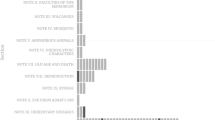Abstract
I REGRET that your correspondent should imagine that, in writing the words “poor old Lamarck”, I showed “scant respect” for the great French naturalist. On the contrary, I desired to express the deep sympathy I felt for this grand pioneer in evolution, who, in old age and blindness, found his splendid achievements, for the time being, discredited by the work and arguments of his successful rival, Cuvier. In the little book which has given rise to this correspondence, I have insisted upon the splendid contributions of Lamarck, not only to botany and zoology, but also to geology, and have shown how the hostility towards his work, felt at first by Lyell and Darwin, was in the end modified, and his great merits acknowledged by both of them.
This is a preview of subscription content, access via your institution
Access options
Subscribe to this journal
Receive 51 print issues and online access
$199.00 per year
only $3.90 per issue
Buy this article
- Purchase on Springer Link
- Instant access to full article PDF
Prices may be subject to local taxes which are calculated during checkout
Similar content being viewed by others
Author information
Authors and Affiliations
Rights and permissions
About this article
Cite this article
JUDD, J. Darwin and the Transmission of Acquired Characters. Nature 85, 474–475 (1911). https://doi.org/10.1038/085474c0
Issue Date:
DOI: https://doi.org/10.1038/085474c0
Comments
By submitting a comment you agree to abide by our Terms and Community Guidelines. If you find something abusive or that does not comply with our terms or guidelines please flag it as inappropriate.



